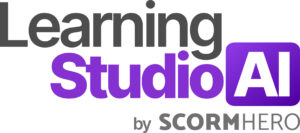Artificial Intelligence (AI) is reshaping the future of education. The rise of generative AI has taken e-learning to new heights, offering both exciting opportunities and unique challenges. But how exactly is AI transforming education? How do GPT-based assistants, media-generating tools, and intelligent learning systems enhance the learning experience? And most importantly, which AI-driven tools should you consider using? Explore these questions and more in our Journal Entry.
Generative AI and the Education Revolution
In the past, AI in education was largely limited to basic chatbots with pre-programmed responses or adaptive testing tools. However, the rise of generative AI – particularly Generative Pre-trained Transformer (GPT) models—has transformed the landscape entirely. These advanced language models can engage in natural conversations, understand context, and even generate text, images, audio, and code with remarkable creativity.
What Makes GPT Special?
GPT models stand out because they learn from vast datasets and generate responses based on context rather than rigid, pre-defined patterns. This allows them to produce more natural, intelligent, and dynamic interactions compared to earlier AI-powered bots. In e-learning, this capability goes beyond content generation – it enhances interaction, personalization, and learner support, making education more engaging and adaptive than ever before.

E-learning in VR: Immersive Learning
Immersive learning can significantly improve the effectiveness of education by harnessing the power of technologies such as virtual, augmented and mixed reality. But what is immersive learning? What are its benefits and how should you go about implementing it?
Read more!Key Applications of AI in Education
AI-driven technologies are revolutionising education, making learning more efficient, accessible, and personalised. Many of these innovations are integrated into modern e-learning systems, enhancing both teaching and student engagement across various domains.
Intelligent Learning Assistants
GPT-based virtual tutors provide real-time support, enhancing learning experiences without human intervention.
- Learners can access support around the clock, eliminating the need to wait for human assistance.
- Automated feedback and assessments enable quick evaluations and personalised learning paths.
- AI-driven interactions allow for dynamic question-and-answer sessions, making learning more engaging.
Content Generation and Customisation
Generative AI adapts educational materials to individual learning styles and progress.
- Learning materials, summaries, and quizzes can be automatically generated, saving educators time.
- Personalised exercises adjust based on a learner’s progress, ensuring targeted practice.
- AI-driven storytelling and problem-solving simulations create immersive learning experiences.
Media Generation: Image, Audio, and Video
AI can create various types of media to enrich educational content.
- Visual elements such as infographics, illustrations, and learning diagrams can be generated to support comprehension.
- AI-powered speech synthesis enables narration for audiobooks, lecture materials, and text-to-speech applications.
- AI-generated animations and explainer videos enhance engagement and understanding of complex topics.
Language Learning and Interactive Practice
Natural language processing (NLP) enhances language education through AI-driven tools.
- Automatic translation and transcription make learning materials more accessible across languages.
- AI-based virtual conversation partners help learners practise real-world dialogues.
- Pronunciation and comprehension exercises provide instant feedback for language improvement.
Learning Analytics and Predictive Assessment
AI analyses learning data to track progress and optimise educational strategies.
- Performance reports highlight trends and learning behaviours.
- Adaptive content recommendations help learners focus on areas that need improvement.
- Automated alerts identify struggling students early, allowing timely intervention.
Scenario-Based Learning
AI-powered scenarios offer interactive, decision-based learning experiences.
- Adaptive simulations provide learners with real-time feedback and evolving scenarios based on their choices.
- Realistic situational exercises help students apply knowledge in a practical context.
- AI customises future learning paths based on previous decisions, making training more effective.
Cheat Prevention
AI plays a crucial role in preventing fraud in both e-learning and traditional education. By leveraging advanced algorithms, it enhances academic integrity through various methods:
- Analysing writing style to verify authorship and detect inconsistencies.
- Conducting plagiarism checks to identify copied content.
- Monitoring online exams and assignments to prevent dishonest practices.
- Generating personalised tests to minimise the risk of cheating.
- Producing automatic fraud reports for swift detection and intervention.
The Limits and Dangers of Artificial Intelligence in Education
Hallucination and Inaccuracy
Generative AI systems do not always provide reliable information. Due to a phenomenon known as hallucination, AI may generate incorrect or entirely fictitious data. This makes continuous monitoring and verification of AI-generated content essential to ensure accuracy and prevent the spread of misinformation.
Ethical Issues and Data Protection
Privacy is a key concern when using AI in education, as these systems often process sensitive learner data. Protecting personal information and ensuring compliance with data protection regulations is crucial. Additionally, AI models can exhibit biases based on the data they are trained on, potentially leading to skewed results if not properly managed. Transparency is equally important – students and educators should be aware of the sources AI relies on to foster trust and informed use.
Distorting the Learning Process
Over-reliance on AI can negatively impact the development of critical thinking and problem-solving skills. If learners become too dependent on AI-generated answers, they may miss out on essential cognitive processes that build deeper understanding. AI should be seen as a supportive tool rather than a replacement for genuine learning, ensuring that technology enhances rather than diminishes educational value.

How Can Science Fiction Help E-learning?
How can we harness sci-fi’s allure to enrich education and support learners? In what ways might it enhance e-learning systems?
Read MoreSpecific Artificial Intelligence Tools in Education
For those looking to leverage the power of generative AI in education, the following tools offer innovative solutions to enhance teaching, learning, and content creation.
Magic School
A customisable AI platform designed for educators and institutions, featuring over 80 tools in a single interface. It supports lesson planning, differentiated instruction, assessment writing, communication, and more.
Course Factory
An automated e-learning courseware builder that enables the creation of interactive courses with AI-assisted content generation.
Schoolai
An AI-powered learning platform that delivers personalised instruction and analytics, helping educators tailor lessons to individual student needs.
Learning Studio AI by Scorm Hero
A SCORM-compliant AI solution that facilitates the creation and integration of learning materials into LMS platforms, ensuring compatibility and efficiency.
Curipod
An interactive teaching tool that generates AI-powered presentations and exercises to enhance classroom engagement.
Fliki
An AI-driven video generator that transforms text and ideas into engaging videos with realistic voiceovers.
Speechelo
A text-to-speech tool that converts any written content into natural-sounding human speech, useful for audiobooks, lectures, and accessibility features.

This journal entry is an updated version of the 2022 entry by our colleague Petra Takács. As a curriculum developer at Klippe, Petra Takács is dedicated to researching innovative educational methodologies and technologies, continually exploring how AI can enhance learning experiences.
You Need Help?
If you would like to start building or developing e-learning, but you are not sure whether it is worth starting, contact us and we will help you choose the best solution. Don’t hesitate, even if resources are limited, as expert assistance can lead to significant savings in both time and costs!
If you found this article useful, follow us on Facebook or Linkedin, to keep up with the latest articles.
Details below will help you contact us via form, phone or e-mail.
⬇️
Who Are We?
We are digital education experts and software developers, following trends and offering innovative solutions in our learning materials and systems. We have been providing digital training, creating complex e-learning materials and implementing systems for X years.
Klippe Learning’s team will create the digital teaching and learning solution you’ve been dreaming of – or we’ll dream it for you if you don’t know exactly what you need. Custom content, creative and motivating methods, a platform tailored to you.
How Can You Reach Us?
To find out more about our bespoke learning materials, e-learning systems, training courses or to request a quote, please contact us:
 contact us via the form on the right!
contact us via the form on the right!
 or call us:
or call us:
 or send an email:
or send an email:








